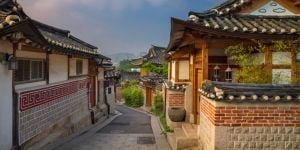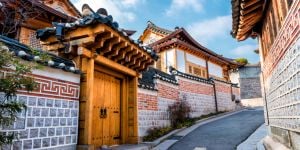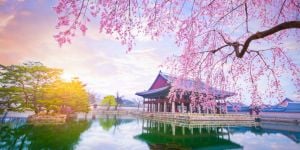
Seoul, the capital of South Korea since the Joseon period (1392-1910) has grown exponentially in the last century, rising to become a key international player both economically and culturally.
Blending centuries of culture with a vibrant dynamism, Seoul is the perfect city for those looking for a change of scenery but who also want to preserve a quality of life similar to that in western Europe. In many respects, Seoul is more modern than the European capitals, but also offers a glimpse of the traditional Korea that saw the birth of the capital 600 years ago.
Seoul's economy and geography
South Korea is a country wedged between China to the West and Japan to the east. Korea's only land border is to the North with North Korea, and taking into account the political context travel between the two is impossible.
As the country's agricultural production is relatively low, South Korea is forced to import a large amount of the food consumed locally, which justifies the high prices in store, especially for fruit and vegetables. Despite these imports, the Korean economy - and especially Seoul - enjoys a strong economy due in particular to the significant exports of Korean electronics, cars and human-value-added industries.
It is thanks to the government's efforts to promote the education of the population that South Korea has gone from one of the poorest countries in the world at the end of the Second World War to the 11th economic power in the world. Education has enabled the country to establish itself as an innovative force in many global markets and thus offset its low export of raw materials.
The climate in Seoul
Winters are freezing in Seoul, (as low as -20°C) but are dry and sunny, while summers are very hot (up to 40°C) but rainy. Despite the climate, South Korea is affected by the monsoons which rise from the tropics, and in winter by the cold currents of northern Asia. Snowfalls can be expected in the capital but generally do not last.
In the spring, even though temperatures are usually pleasant, the city suffers from the phenomenon of "yellow sand" which is carried to South Korea from the deserts of Mongolia and China. Unfortunately, the phenomenon worsens each year because of the added issue of human pollution. Seoul is now one of the most polluted cities in the world, and high-pollution periods are increasing more and more, creating a growing number of respiratory problems. It is advisable to monitor the level of pollution every day - and even several times a day - to know when to wear an anti-pollution mask, especially for those with any respiratory issues. Depending on the level of pollution, outdoor activities are discouraged and require any participants to wear an anti-pollution mask. People with a sufficient budget should consider the purchase of an air purifier for their accommodation (do not confuse air humidifiers with air purifiers - the minimum prices for these are at around 200,000 won).
The Korean's favourite season is often autumn. Although the season is short, temperatures are mild, and pollution is less significant, and landscapes are adorned with red and yellow. The presence of many parks and mountains in Seoul makes this season particularly enjoyable and allows you to escape the city with less cost and effort.
Social life in Seoul
Social life in Seoul is lived outside the home. The key to meeting people in Seoul is being out, and it is only while being out that you will be able to maintain your social relationships.
Communicating often and getting news from your Korean friends is essential when your relationship is recently developed. As direct rejections and refusals to invitations are rare and considered very impolite. If a Korean offers to meet up once or twice and you decline (even for genuine reasons), your reaction may be perceived as a desire not to continue the relationship. Consequently, to maintain a friendship, you will need to be proactive, available and adaptive to Korean social codes.
Korean society is very hierarchical, so don't neglect professional interactions once you have finished work - while never forgetting the formalities of that hierarchy. Social lives in Seoul are also conducted through your colleagues and superiors, with whom it is always advantageous to have a good relationship.
Whether you are a man or a woman, do not be surprised at the tactile ease that Korean people have with people of the same sex. Modesty here is not the same as in the West, and while communal baths are separated by gender, Koreans are completely naked without embarrassment when amongst people of the same sex. However, touching between people of the opposite sex is almost always romantic in nature, so touching a man's arm as a woman will most often be seen as a flirtation (and vice versa).
Seoul is a city that never sleeps, so you will always find something to do, whether you are alone, with friends or with a partner.
The cost of living in Seoul
Seoul, as the capital city, is the most expensive city in South Korea. To live comfortably, your budget will be comparable to that required to live in a large European city, while the minimum wage is higher than in many countries. However, Seoul offers more economical housing solutions than those offered in Paris or London, and, for a person saving, your food budget can also be cheap. For a healthy diet, you will need to consider a budget for fruit and vegetables (for example, it's not uncommon to see a price of 5,000 Won (almost 4 Euros) for four apples).
The price of public transport in Seoul may seem advantageous with a base rate of around €1, however, the lack of a monthly subscription requires users to pay for each of their trips - a fact that will favour the most sedentary but will soon prove expensive for those who have to pay. Those who go out and travel a lot in the city will have to bear in mind that Seoul is six times larger than Paris.
Travelling to Seoul
South Korea is a country that requires a visa for any stay exceeding 90 days for many nationalities. Not all visas give access to the labour market and / or to any kind of profession, but it is absolutely necessary to follow visa regulations to the letter, otherwise, you will be forbidden to stay in Korean territory.
The necessary information is available on Republic of Korea's official website.
We do our best to provide accurate and up to date information. However, if you have noticed any inaccuracies in this article, please let us know in the comments section below.








